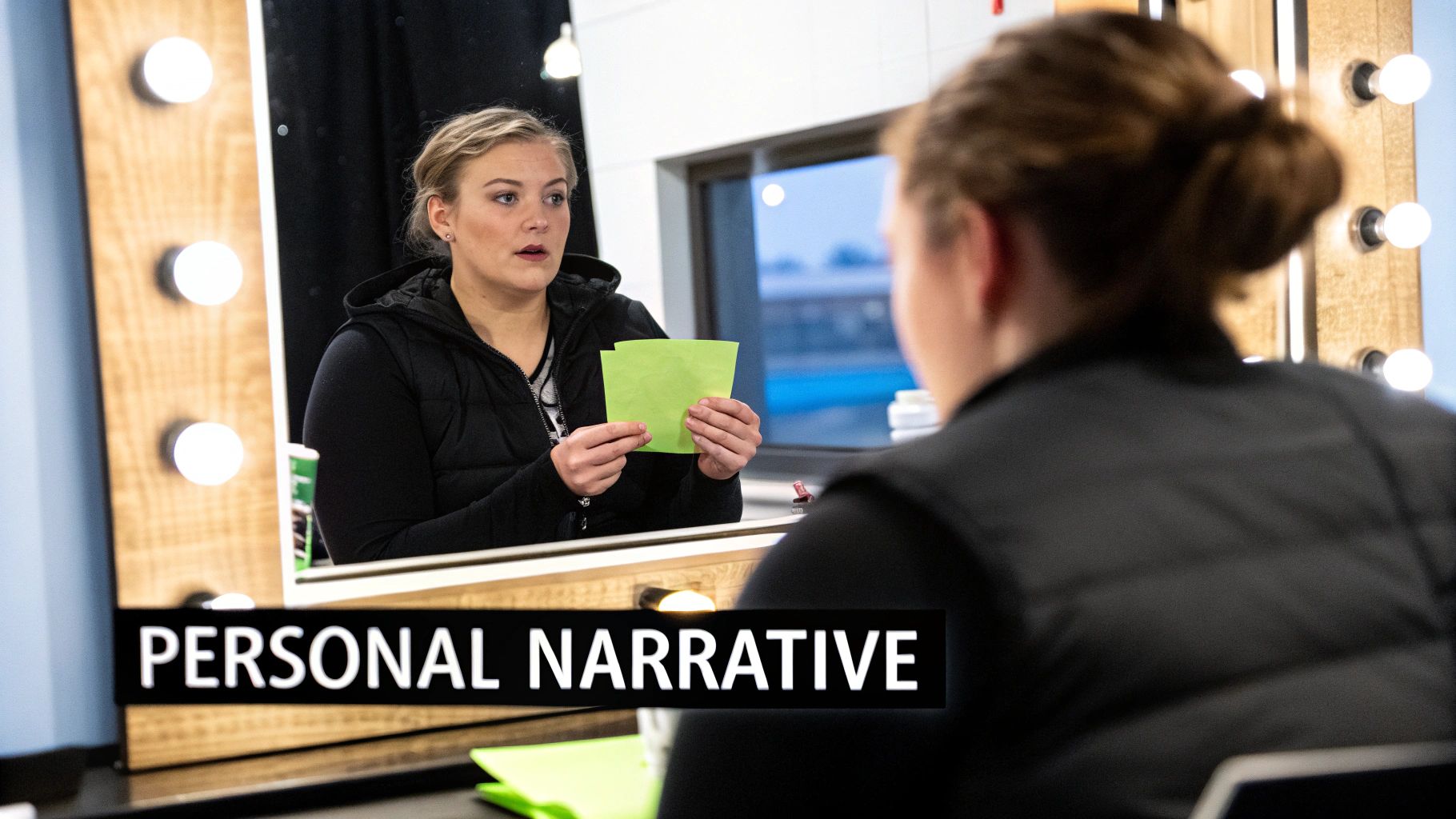The medical school interview is the final, pivotal step between your impressive application and an acceptance letter. It's where the admissions committee moves beyond your GPA and MCAT score to understand who you are as a person and a future physician. While the pressure is high, preparation is your greatest asset. Your entire journey, "From Application to Acceptance," hinges on effective preparation. For a more detailed overview of interview readiness, consider consulting a comprehensive interview preparation guide to build a solid foundation.
This guide provides 8 essential medical school interview tips, moving beyond generic advice to offer actionable strategies and fresh perspectives. We'll break down exactly how to research a school effectively, articulate your story with impact, and handle the toughest questions with confidence and poise. These are not just concepts; they are specific, implementable steps designed to give you an edge.
Our goal is to help you transform interview anxiety into a powerful, professional performance. By mastering these strategies, you will be fully equipped to showcase your unique strengths, convey your passion for medicine, and demonstrate precisely why you are an ideal candidate for their program. Let's get started.
1. Research the School Thoroughly
One of the most effective medical school interview tips is to demonstrate a genuine, well-researched interest in the specific institution you are interviewing with. Admissions committees want to accept students who are genuinely enthusiastic about their unique programs, not just those looking for any medical school acceptance. Going beyond a surface-level glance at the school's website shows respect, initiative, and a proactive mindset, qualities of a successful future physician.

Thorough research allows you to tailor your answers, especially to the crucial question, "Why our school?" Instead of a generic response, you can articulate a compelling case for why you are an excellent fit for their specific community, curriculum, and mission. This deep knowledge transforms you from a general applicant into a candidate who has thoughtfully envisioned their future at that institution.
How to Implement This Strategy
To make your research effective, create a dedicated document for each school. Populate it with specific details that resonate with your own experiences and aspirations.
- Curriculum & Pedagogy: Does the school use a traditional, problem-based learning (PBL), or case-based learning model? Be prepared to discuss why their specific approach aligns with your learning style.
- Mission and Values: Identify the school’s core mission. Is it focused on primary care in underserved areas, cutting-edge biomedical research, or global health? Connect your past experiences (e.g., volunteering at a rural clinic) to their stated goals.
- Specific Programs & Research: Pinpoint unique offerings. Mention a specific research lab, a global health initiative, or a student-run clinic you are excited about. For example, you could say, "I was particularly drawn to Dr. Smith's research on neurodegenerative diseases, as it aligns with my undergraduate work in neuroscience."
- Recent News: Briefly review recent publications or news from the school. Mentioning a recent achievement shows you are actively following their progress.
By connecting your personal story to the school's specific attributes, you demonstrate that your interest is both authentic and well-informed. This level of preparation is a key component of a successful application strategy; you can find more in-depth guidance on how to stand out by exploring comprehensive medical school admissions prep.
2. Practice the Common Interview Questions
While you should never deliver memorized, robotic answers, practicing responses to common medical school interview questions is a critical preparation step. Interviewers ask predictable questions to assess your motivations, character, and suitability for their program and the medical profession. Thoughtful practice allows you to structure your thoughts, articulate your points clearly, and deliver confident, authentic responses even under significant pressure.
Effectively preparing for these questions helps you connect your personal experiences to the qualities of a future physician, such as empathy, resilience, and teamwork. It ensures you have a well-organized arsenal of anecdotes ready to deploy, preventing you from fumbling for an example when asked about leadership or handling a difficult situation. This preparation is a cornerstone of any effective medical school interview tips and strategies.
How to Implement This Strategy
The goal of practice is not to script answers but to build a framework for them. This involves organizing your key experiences and learning to apply them to various prompts. To further refine your responses and anticipate common inquiries, exploring resources that detail general common interview questions and answers can be highly beneficial.
- Use the STAR Method: For behavioral questions ("Tell me about a time when…"), structure your stories using the Situation, Task, Action, and Result method. This ensures your answers are concise, complete, and impactful.
- Prepare Versatile Anecdotes: Develop a list of 5-7 core experiences from your academic, volunteer, and personal life. Think about how each story demonstrates different qualities like leadership, problem-solving, empathy, or teamwork. One strong story can often answer multiple types of questions.
- Practice Out Loud: Record yourself answering questions or practice with a mentor, friend, or admissions consultant. This helps you identify and eliminate verbal fillers (like "um" or "like"), check your pacing, and refine your body language.
- Keep It Concise: Aim for answers that are around two minutes long. This is enough time to provide a detailed, thoughtful response without losing the interviewer's attention. Use a timer during practice to get a feel for this length.
By mastering your key stories and practicing their delivery, you can walk into your interview feeling prepared and self-assured, ready to showcase the best version of yourself. These rehearsal techniques are as crucial as your initial studying, a principle that successful students apply throughout their careers; you can explore similar effective study strategies to excel in your medical education.
3. Dress Professionally and Appropriately
First impressions are powerful, and in the formal setting of a medical school interview, your attire is the first signal you send. Dressing professionally demonstrates respect for the institution, the interviewers, and the medical profession itself. Your appearance should be conservative and polished, conveying maturity and seriousness of purpose. This allows your personality and qualifications to be the focus of the conversation, rather than a distracting wardrobe choice.

Choosing the right outfit is a key part of your interview preparation that shouldn't be left until the last minute. A well-fitted, comfortable, and appropriate ensemble boosts your confidence and helps you project a professional demeanor from the moment you arrive. This attention to detail is one of the subtle yet important medical school interview tips that can set you apart.
How to Implement This Strategy
Your goal is to look neat, professional, and understated. Opt for conservative business attire that fits well and is free of wrinkles.
- For Men: A well-fitted suit in a conservative color like navy or charcoal grey is the standard. Pair it with a light-colored dress shirt, a conservative silk tie, dark socks, and polished dress shoes.
- For Women: A business suit with either pants or a skirt is a safe and professional choice. A conservative dress with a blazer is also appropriate. Choose closed-toe, low-heeled shoes and opt for minimal, classic jewelry.
- Grooming: Ensure your hair is neat and styled away from your face. Nails should be clean and trimmed. Avoid wearing strong fragrances, as some interviewers may have sensitivities or allergies.
- Final Checks: Try on your complete outfit several days before the interview to check for fit, comfort, and any needed repairs. Consider the weather and your travel plans, bringing a professional coat if necessary. Carrying a portfolio or padfolio for your documents completes the professional look.
4. Prepare Thoughtful Questions to Ask
An often-overlooked yet critical part of the medical school interview is the opportunity you get to ask questions. This is not a mere formality; it is a powerful tool to demonstrate your intellectual curiosity and genuine interest. Admissions committees use this moment to gauge how deeply you have considered their program and your future in medicine. Asking generic questions suggests a lack of preparation, while thoughtful inquiries show you are an engaged, critical thinker.

This part of the interview is also your chance to evaluate the school. Remember, you are choosing a community where you will spend four transformative years. Your questions can uncover details about student life, faculty support, and the school's culture that are not available in brochures or on the website. This is a key strategy for ensuring the school is the right fit for you, not just the other way around.
How to Implement This Strategy
The key is to prepare specific, open-ended questions that invite a detailed response. Aim to have 5-7 well-crafted questions ready, though you will likely only ask 2-3.
- Avoid easily searchable questions: Never ask something that can be answered with a quick search of the school's website (e.g., "What is your class size?"). This signals a lack of basic research.
- Ask about personal experiences: Engage your interviewer directly. A great question is, "What do you enjoy most about working with students here?" or "What is a recent change at the medical school that you find most exciting?" This creates a personal connection and provides unique insight.
- Inquire about evolution and future direction: Show that you are thinking long-term. Ask questions like, "How has the curriculum evolved in response to student feedback over the past few years?" or "What new opportunities for interdisciplinary research do you see developing for students?"
- Connect to your interests: Frame questions around your specific passions. For example, "I'm very interested in health policy. What opportunities, formal or informal, exist for students to engage with this field at the medical center or in the community?"
By preparing and asking intelligent questions, you reinforce your candidacy and gather crucial information for your decision-making process. This proactive approach is one of the most effective medical school interview tips for leaving a lasting, positive impression.
5. Practice Your Personal Story and Motivation
Your personal narrative is the heart of your medical school interview. It’s the cohesive story that connects your experiences, values, and ambitions to your decision to pursue medicine. Admissions committees want to understand not just when you decided to become a doctor, but why medicine is the only career that truly aligns with your character and future goals. A well-crafted narrative is authentic, compelling, and demonstrates a mature understanding of the profession's challenges and rewards.

This story is your answer to foundational questions like, "Tell me about yourself," and "Why do you want to be a doctor?" A strong narrative moves beyond clichés and provides concrete evidence of your suitability for medicine. It shows self-awareness and the ability to reflect on your journey, transforming a list of activities into a purposeful path toward becoming a physician. This is one of the most critical medical school interview tips because it forms the backbone of your entire interview performance.
How to Implement This Strategy
To develop a powerful narrative, you must connect the dots between your past actions and future aspirations. This requires deep reflection on what drives you. As you practice, consider exploring tips for self-discovery to deepen your understanding of your core motivations.
- Structure Your Narrative: Don’t just list experiences chronologically. Instead, group them thematically. For example, connect your volunteer work at a free clinic to your interest in addressing health disparities, or link your research in a basic science lab to a passion for translational medicine.
- Show, Don't Tell: Instead of saying you are compassionate, describe a specific patient interaction where you demonstrated empathy and what you learned from it. For instance, describe how comforting a nervous patient before a procedure taught you the importance of patient education and trust.
- Practice Different Lengths: Prepare to tell your story in various formats. Have a concise 1-minute "elevator pitch," a more detailed 3-minute version, and be ready to elaborate for 5 minutes or more if prompted. This versatility ensures you are prepared for any interview style.
- Connect to the Future: Your story shouldn't just be about the past. Conclude by explaining how these formative experiences have prepared you for the specific challenges and opportunities at the interviewing school and in your future medical career.
6. Be Authentic and Honest
While preparing polished answers is crucial, one of the most underrated medical school interview tips is to remain authentic. Admissions committees interview hundreds of candidates and can often spot rehearsed or disingenuous responses. They are looking to admit real people, not perfect robots, who will one day interact with diverse and vulnerable patients. Being honest about your journey, including challenges and uncertainties, builds trust and allows them to see the genuine person behind the application.
Authenticity makes you more memorable and relatable. Sharing how a failure taught you a valuable lesson or expressing genuine emotion about a patient interaction resonates more deeply than a flawless but impersonal story. This honesty demonstrates self-awareness, resilience, and humility, key attributes for a physician who must navigate the complex and demanding realities of medicine.
How to Implement This Strategy
Balancing professionalism with authenticity requires practice. Your goal is to be your best self, not a different self. Prepare honest, reflective answers that showcase your true character and motivations.
- Prepare for "Weakness" Questions: Instead of a cliché answer like "I'm a perfectionist," prepare a genuine example of a past challenge. Discuss a real area of growth, what you learned from it, and the concrete steps you have taken to improve. For example, "In my early undergrad years, I struggled with time management when juggling a heavy course load and research. I learned to use a planner and set mini-deadlines, a system I still use today."
- Share Your Real Story: Don't exaggerate your accomplishments or create dramatic narratives. Your actual experiences are powerful enough. Discussing a real challenge you faced in a volunteer role, even if it was small, and how you navigated it, is more impactful than an embellished tale.
- Embrace Vulnerability (Appropriately): It is okay to show that you are human. If asked about a difficult experience, it is acceptable to convey genuine emotion. Acknowledging that a situation was challenging or that you are still undecided between two specialties shows honesty and maturity.
- Practice Being Yourself: Ask friends or mentors to conduct mock interviews and give you feedback on how you come across. The goal isn't to change your personality but to become comfortable expressing it in a professional interview setting.
By presenting an honest and authentic version of yourself, you allow the admissions committee to connect with you as a future colleague and caregiver. This genuine connection is often the deciding factor between two equally qualified candidates.
7. Demonstrate Knowledge of Healthcare Issues
Medical school admissions committees are not just looking for students with high GPAs and MCAT scores; they want future physicians who are engaged with the world around them. Demonstrating a solid understanding of current healthcare issues is one of the most impactful medical school interview tips. This shows you are a mature, curious candidate committed to the profession beyond the classroom and clinic, and that you understand the broader context in which you will one day practice medicine.
Being conversant in topics like healthcare policy, public health crises, and medical ethics allows you to engage in a more sophisticated conversation with your interviewers. It signals that you have been thinking critically about the challenges and responsibilities of being a physician. This level of awareness can distinguish you as a candidate who is ready for the complexities of modern medicine, not just the science behind it.
How to Implement This Strategy
To effectively discuss these topics, you must go beyond headlines and develop a nuanced perspective. Preparation is key to avoiding generic or uninformed statements.
- Stay Informed: Regularly read reputable sources like STAT News, Modern Healthcare, or the health sections of major newspapers. Follow key organizations like the AAMC or the AMA for policy updates.
- Understand Multiple Viewpoints: For complex issues like healthcare reform or the opioid crisis, make an effort to understand the different perspectives involved, including those of patients, providers, insurers, and policymakers. Acknowledging complexity is a sign of maturity.
- Connect to Your Experiences: Tie broader issues to your personal experiences when possible. For example, if discussing rural healthcare access, you could mention, "While volunteering at a mobile clinic, I saw firsthand how transportation barriers directly impacted patient follow-up and chronic disease management."
- Focus on Solutions: Don't just identify problems. Show that you have thought about potential solutions. When discussing physician burnout, you could mention system-level changes like improved EHR usability or protected administrative time, demonstrating a forward-thinking and constructive mindset.
By thoughtfully preparing to discuss current events in medicine, you show your interviewers that you are not just an applicant; you are a future colleague ready to tackle the field's most pressing challenges.
8. Follow Up Appropriately After the Interview
Your performance during the interview is paramount, but your engagement shouldn't end the moment you walk out the door. A professional, thoughtful follow-up is a critical final step that reinforces your interest and demonstrates courtesy. This gesture shows the admissions committee that you value their time and are serious about their program. However, a clumsy or overly aggressive follow-up can undermine an otherwise strong interview, making it crucial to strike the right professional balance.
A well-crafted thank-you note serves as more than just a formality; it's a strategic tool. It allows you to briefly reiterate your enthusiasm, reconnect on a key point from your conversation, and show appreciation for the interviewer's insights. This small act of professionalism can help you remain a positive and memorable candidate in a sea of highly qualified applicants, subtly reinforcing why you are a great fit for their incoming class.
How to Implement This Strategy
The key is to be prompt, personal, and professional. Whether you send an email or a handwritten card (email is generally faster and more common), your message should be concise and genuine.
- Timing is Key: Send your thank-you note within 24 to 48 hours of your interview. This timeframe shows you are organized and enthusiastic while the conversation is still fresh in the interviewer's mind.
- Personalize Your Message: Avoid generic templates. Mention a specific topic you discussed that you found particularly insightful or interesting. For example, "I especially enjoyed our conversation about the student-run free clinic and its impact on the local community." This proves you were actively listening.
- Reiterate Your Fit: Briefly connect a point from your conversation back to your qualifications or passion for that specific school. A simple sentence like, "Learning more about the global health track solidified my interest in your program" can be very effective.
- Keep it Brief and Professional: Your note should be a few short paragraphs at most. Express your gratitude, mention a specific detail, reiterate your interest, and sign off professionally. Proofread meticulously for any spelling or grammar errors. This attention to detail is just one of many skills you'll need, as you'll learn more about effective medical student time management tips to stay on top of your responsibilities.
8 Medical School Interview Tips Comparison
| Item | Implementation Complexity 🔄 | Resource Requirements ⚡ | Expected Outcomes 📊 | Ideal Use Cases 💡 | Key Advantages ⭐ |
|---|---|---|---|---|---|
| Research the School Thoroughly | Moderate (time-intensive) | Medium (2-3 hours per school) | Strong demonstration of fit and knowledge | Best for demonstrating genuine interest | Shows preparation and professionalism |
| Practice the Common Interview Questions | Moderate (requires repetition) | Low to Medium (time + mock interviews) | Increased confidence and organized answers | Useful for handling common, predictable questions | Reduces anxiety and improves coherence |
| Dress Professionally and Appropriately | Low (one-time prep) | Low to Medium (cost of attire) | Positive first impression and respect | Essential for all interviews | Boosts confidence and shows professionalism |
| Prepare Thoughtful Questions to Ask | Low to Moderate (planning needed) | Low (research + question prep) | Displays engagement and critical thinking | Ideal for creating interactive dialogue | Provides meaningful information exchange |
| Practice Your Personal Story and Motivation | Moderate (story crafting) | Low to Medium (time for practice) | Clear presentation of motivation and growth | Useful for answering "tell me about yourself" | Shows self-awareness and genuine motivation |
| Be Authentic and Honest | Low (mindset adjustment) | Minimal | Builds trust and rapport | Critical in all interview interactions | Makes candidate relatable and memorable |
| Demonstrate Knowledge of Healthcare Issues | Moderate (ongoing learning) | Medium (regular reading/research) | Shows intellectual engagement and readiness | Effective when discussing current events or ethical issues | Demonstrates critical thinking and commitment |
| Follow Up Appropriately After the Interview | Low (simple communication) | Minimal | Reinforces professionalism and interest | Best after interview to maintain rapport | Shows courtesy and professionalism |
Integrating These Tips for a Confident Performance
The medical school interview is the final, pivotal step in a long and demanding application process. It’s the moment where the statistics and essays on your AMCAS application transform into a three-dimensional person. Navigating this high-stakes conversation successfully isn't about memorizing a script; it’s about synthesizing preparation with personality. The eight core strategies we've explored provide a comprehensive framework for turning potential anxiety into a confident, compelling performance.
From Preparation to Poise
Think of these medical school interview tips not as a checklist to be completed, but as interconnected pillars supporting your overall presentation. Your thorough research into a school's mission and programs (Tip #1) directly informs the thoughtful questions you'll ask your interviewers (Tip #4). Likewise, practicing common questions (Tip #2) helps you refine the delivery of your personal story and motivation (Tip #5), ensuring it comes across as both polished and genuine.
The goal is to internalize these concepts so deeply that they become second nature. When you are no longer worried about what to say, you can focus on how you say it. This is where authenticity (Tip #6) truly shines. An admissions committee wants to see the real you, the person who will one day interact with patients with empathy and professionalism. Your ability to discuss broader healthcare issues (Tip #7) demonstrates that your passion for medicine extends beyond personal ambition and into a genuine concern for the community you will serve.
Your Actionable Next Steps
Mastering these skills requires active practice, not just passive reading. To truly integrate these tips and build unshakable confidence, your next steps should be:
- Create a "Story Bank": Go beyond just your personal statement. Write down 5-7 key experiences from your academic, clinical, research, and personal life. For each, outline the situation, the actions you took, and the outcome or lesson learned. This bank will become your go-to resource for answering behavioral questions.
- Schedule Mock Interviews: This is non-negotiable. Enlist trusted pre-med advisors, mentors, or even family members to conduct mock interviews. Record these sessions and review them critically. Pay attention to your pacing, body language, and use of filler words like "um" or "like."
- Stay Current: Dedicate 15-20 minutes each day to reading about current events in healthcare. Follow reputable sources like the New England Journal of Medicine, STAT News, or the health section of major news outlets. This practice will make discussing complex topics feel natural and informed.
Ultimately, your interview is your opportunity to prove you are more than a collection of grades and scores. It is your chance to connect, to show your enthusiasm, and to demonstrate that you possess the maturity and insight to become an outstanding physician. By weaving these medical school interview tips into a cohesive preparation strategy, you are not just preparing for a single day; you are investing in the communication skills that will define your future medical career.
Ready to transform your interview skills from good to exceptional? The expert advisors at Ace Med Boards specialize in medical school admissions, offering one-on-one coaching and realistic mock interviews to provide the personalized feedback you need. Visit Ace Med Boards to learn how you can walk into your interview day with the confidence and polish that gets you accepted.

